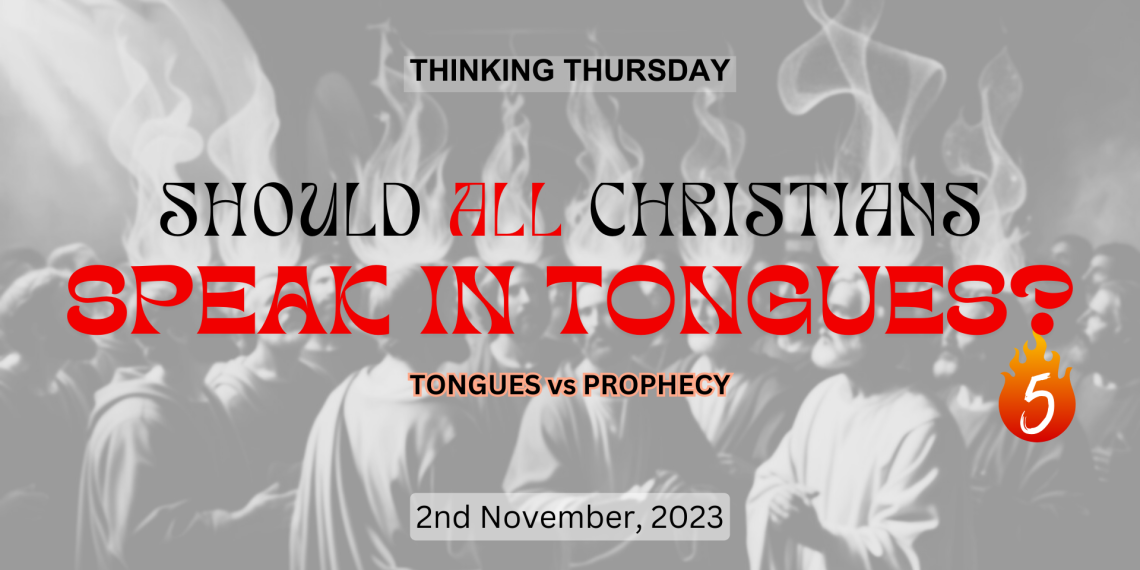Tongues vs Prophecy
As for the one who has the gift of speaking in one or diverse languages (tongues), the apostle Paul gave directions about how the gift is to be administered during church meetings in 1 Corinthians 14. He said:
[1] Pursue love, and desire spiritual gifts, but especially that you may prophesy.
[5]I wish you all spoke with tongues, but even more that you prophesied; for he who prophesies is greater than he who speaks with tongues, unless indeed he interprets, that the church may receive edification.
[6]But now, brethren, if I come to you speaking with tongues, what shall I profit you unless I speak to you either by revelation, by knowledge, by prophesying, or by teaching?
[7]Even things without life, whether flute or harp, when they make a sound, unless they make a distinction in the sounds, how will it be known what is piped or played?
[8]For if the trumpet makes an uncertain sound, who will prepare for battle?
[9]So likewise you, unless you utter by the tongue words easy to understand, how will it be known what is spoken? For you will be speaking into the air.
[10]There are, it may be, so many kinds of languages in the world, and none of them is without significance.
[11]Therefore, if I do not know the meaning of the language, I shall be a foreigner to him who speaks, and he who speaks will be a foreigner to me.
[12]Even so you, since you are zealous for spiritual gifts, let it be for the edification of the church that you seek to excel.
[13] Therefore let him who speaks in a tongue pray that he may interpret.
READ ALSO: SHOULD ALL CHRISTIANS SPEAK IN TONGUES? (Part 4)
Tongues + Interpretation = Prophecy
Let us pause here, to point out that the apostle Paul is teaching about those who bring messages in a different language in a meeting where no one understands the language. If I go to a meeting of people who do not speak Ibibio, and I give them a message in my language, they will not understand my message, and I have not edified them (built them up). So Paul said that the person who has the gift of bringing messages in a different tongue should pray for the gift to interpret also, so that they can communicate and pass the message to those who hear them.
[16]Otherwise, if you bless with the spirit, how will he who occupies the place of the uninformed say “Amen” at your giving of thanks, since he does not understand what you say?
[17]For you indeed give thanks well, but the other is not edified.
[18]I thank my God I speak with tongues more than you all;
[19]yet in the church I would rather speak five words with my understanding, that I may teach others also, than ten thousand words in a tongue.
[26]How is it then, brethren? Whenever you come together, each of you has a psalm, has a teaching, has a tongue, has a revelation, has an interpretation. Let all things be done for edification.
[27]If anyone speaks in a tongue, let there be two or at the most three, each in turn, and let one interpret.
[28]But if there is no interpreter, let him keep silent in church, and let him speak to himself and to God.
[29]Let two or three prophets speak, and let the others judge.
[30]But if anything is revealed to another who sits by, let the first keep silent.
[31]For you can all prophesy one by one, that all may learn and all may be encouraged.
[32]And the spirits of the prophets are subject to the prophets.
[33]For God is not the author of confusion but of peace, as in all the churches of the saints.
[39]Therefore, brethren, desire earnestly to prophesy, and do not forbid to speak with tongues.
[40]Let all things be done decently and in order [taxis]
READ ALSO: SHOULD ALL CHRISTIANS SPEAK IN TONGUES? (Part 1)
Thayer Definition:
1) an arranging, arrangement
2) order
2a) a fixed succession observing a fixed time
3) due or right order, orderly condition
The above instructions are for when people are passing a prophetic message to the church. It is expected that there be orderly, sequential delivery in the church meetings to avoid confusion. 1 Corinthians 14 very clearly encourages believers to speak publicly in tongues as it amounts to prophecy, one of the top gifts, WHEN IT IS INTERPRETED. However, if there is no interpretation, he said, ‘Then speak to yourself and to God in tongues!’
However, when it comes to praying to God, Paul says:
[14]For if I pray in a tongue, my spirit prays, but my understanding is unfruitful.
[15]What is the conclusion then? I will pray with the spirit, and I will also pray with the understanding. I will sing with the spirit, and I will also sing with the understanding.
So, speaking in tongues and praying in tongues are different to the extent the first refers to communicating with men while the second speaks of communicating with God.
If prophecy is okay, speaking and praying in tongues is also okay. But the best form of tongues for building up the church is when it is interpreted. If it builds up the church, it is pleasing to God.
So should only some people build up the church? Or should everyone?
READ ALSO: SHOULD ALL CHRISTIANS SPEAK IN TONGUES? (Part 6)










